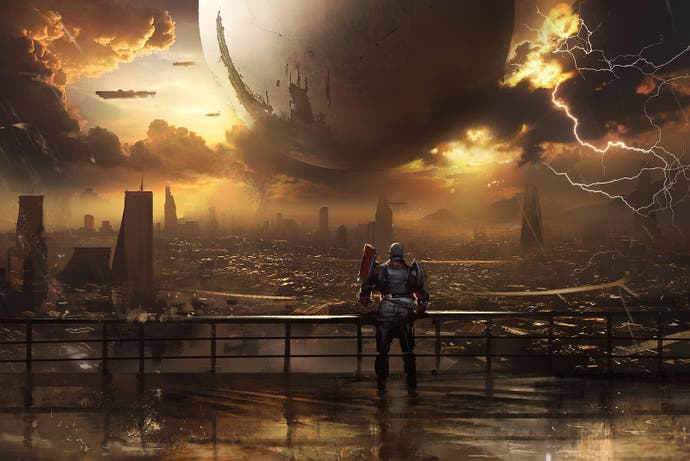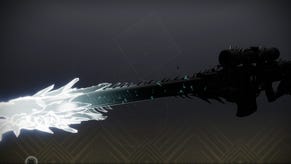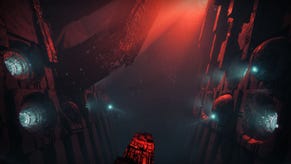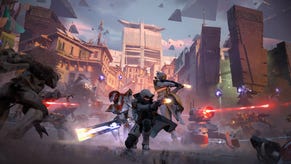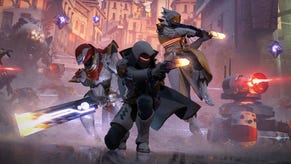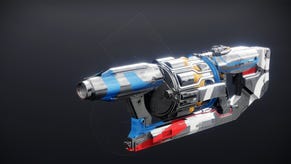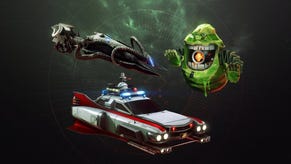Destiny 2 is already nostalgic for Destiny
Light relief.
I played a bit of Destiny 2 last night, and wow, there's the Tower up in smoke. First thing, seconds into the game, and the whole place has been trashed, while gods - or humans who have ascended to some place near gods - are flung in every direction as space invaders move in. The Tower's not a social area anymore, a downtime spot safe from the carnage. It's a battleground now, crumpled and set aflame, filled with what look like bulky 40K Space Marine baddies who vent noxious fumes out of their necks when you pop their heads off.
Having played a few video games by now I am familiar with this trick: explosition, if you fancy. The early moments of a game often need to tell you a lot of information. They also want to provide a linear environment in which you can't get lost as they teach you to crouch. They also want to show off the engine's graphical powers. Explosition covers all of this stuff. Flames sharpen the sense of urgency, so you listen to the voice in your ear a little more intently. Rubble blocks off alternate routes. All of that smoke looks just lovely - how did they do it on aging tech? And before you know what's what, a bit of the roof has come down so you have to crouch to get under it.
All the while, I was aware that I was missing out on something, though. I was aware that Bungie was delivering a message that I couldn't receive with any clarity. Having never played the first Destiny, I couldn't understand the impact of having the Tower so suddenly dismantled. I had to come into work the next day and chat over email with Tom Phillips, who it turns out had a far more emotional time learning to crouch.
"The Tower is an area I spent, without exaggeration, hundreds of hours in," he wrote. "Seeing it replicated at the beginning of Destiny 2, cratered and on fire, I ignored the main mission and went around to check on my favourite haunts - there's a tree I used to climb and sit in - and find out if any of my favourite vendors were lying around, Aunt Beru-like in flames."
And it wasn't all bad. "Then later I get to see beyond the door I passed dozens and dozens of times on my way to the Speaker," Tom told me. "Turns out there's a whole world back here, and which had been here the whole time."
Which had been here the whole time. Some aspect of that phrase gets at something that surprised me about Destiny 2. Namely, that Destiny 2 is terribly nostalgic for Destiny 1. Two games in and the series is already dismantling past glories, in order to drive home that nostalgic feeling: Oh man, this is where I used to go shopping! Oh man, this is what's actually behind that door that never opened!
Mostly, I was surprised that Destiny was hitting the nostalgia period so early on. Wasn't this a series with a comically lengthy lifespan planned for it? Weren't there years of games stacked up and ready to land at clearly marked intervals? Isn't it too soon to kill an icon and get us all schmaltzy about it?
Yes yes, but I had neglected to take into account the complex relationship with nostalgia that games like Destiny have. Shared world games - I'm just going to call them MMOs for the sake of this article - mean that we spend a long time in these virtual spaces. We spend a long time just being there. We log on to see who is about, or because we have five minutes between things and logging on is a force of habit. We build up relationships with the social areas as much as with other players. We see doors every day and start to wonder what is behind them. Bungie memorialised Destiny 1's infamous loot cave in-game as quickly as it removed the exploit. In Rise of Iron, Tom tells me, there's a particularly hammy scene where you revisit the game's opening location and Nolan North tells you how happy he is to have been your Ghost all this time - even though Nolan didn't turn up until a year into Destiny, after the patching out of Peter Dinklage.
You spend a lot of time in single-player games, too, but you're often moving forwards in single-player games, and leaving much of what you see behind, aside from the odd hub or the odd piece of asset recycling. In MMOs, you don't move forwards so much as back and forth. You hang around. This means that these games become our homes much quicker than you might otherwise expect, I think. And that word 'nostalgia': in James Gleick's wonderful Time Travel, A History, which I have just finished reading and deeply, deeply recommend, I learned that nostalgia originally had a slightly different definition. It meant homesickness.
Besides, nostalgia - the current definition - is baked into Destiny in particular. There's the ghost of Halo, certainly, but there's also the fact that this is a story that hums with alleged sorrow about the passing of a Golden Age, long since lost to history. The whole game has to pull off a neat temporal trick, in fact, and nostalgia is at the center of it. The characters we play as look backwards to a glory era which is in the distant past and yet still, to us, as seen from the vantage point of a 21st century player, firmly in the future too.
And beyond that, there's the lingering memories of that bodged launch. Even I know about that, storylines gutted and chewed up and recycled as Grimoire cards, a landscape that ached with history but seemed unattached to its own feeble lore. Because of that launch, and because of the lengthy run-up to that launch, it seems like we've always been waiting for Destiny to arrive. Even in the years that it was out and playable, we were waiting for it to fix itself, clear its throat, and properly announce its arrival and its ambitions. Meanwhile, the game people played - the game people loved and sometimes played far too much, missing sleep and coming in late to work the next day - seemed born into its own middle act, already a game about grinding, shopping, cheesing, repeating. About wearing grooves in a landscape that looked fantastical but whose pleasures over time seemed to reveal themselves as being wonderfully mundane: partying up, wiping hilariously, all hunting for the same thing to buy, all wondering what the shops would stock the next time they were open. I still think that Destiny had no real beginning - it needed a better story in order to have that. It was born in motion, and the motion was taking it in pleasant circles, or rather leading it up a looping ramp like the kind you might find in a multistory carpark, the same skyline passing in and out of view as you levelled higher and higher.
The gist of all this, I reckon, is that Destiny is a game that requires you to settle in, to find a place for yourself. Maybe, I thought last night, it wasn't too late for me. Past the burning Tower - and past a misjudged section in which you lose all your powers and lurch through wilderness for a while as the soundtrack abuses the memory of Vaughan Williams - I started to see how this might happen. I arrived at a farm, or rather The Farm. A hub, I guessed. Seemed a bit lonely compared to all I'd heard of the Tower. But no matter, before I had time to try and make myself at home, I was off on a proper mission anyway.
And ooh, it was quite weird. Maybe Destiny wasn't just nostalgia. Maybe it genuinely had a bit of wonder to it after all? Through a great rusting wall I found myself in a misty, Sleepy Hollow forest. This was the EDZ and it was wild and sinister. The light dropped down to a flicker glimpsed through smoke, and I started to wonder if all of Destiny 2 would be jarring and bizarre, if I would be endlessly sent on missions I did not understand while invisible creatures attacked from all corners.
But then I pressed further on and I got a handful of old powers back. Light! I had heard people talking endlessly about Light. Turns out it means you can double-jump, pull off a special move, and respawn more easily. Suddenly I had a mini-boss to kill, and I started to understand the function of this mission: a classic back-to-basics affair, rounded with loot and a level up. And then I was back in the comfort of a place I had been many times before, across many games: an inventory screen. Deep in the future, mankind first elevated then brought low then cruelly attacked out of nowhere, and I was picking between two kinds of magical shoe.
Back to The Farm and there were suddenly other players there. Of course! I had emerged from an instance, a beginner's instance. The next mission only piled it all on further - not the wonder and the mist, but the familiarity.
And here we are in the endless present: back to the EDZ, circling a church that looks like it had had a major deal going with a mobile phone carrier before the collapse, what with all that stuff clamped to the spire. I discover that the real throughline to Destiny 2 might be following a little diamond around as it takes me between objectives. It takes me to Devrim, a lovely beardo sniping cheerily from a tower, and then out into the streets for some good old questing. The combat is Halo, the structure is Diablo or WOW. The narration makes a half-hearted stab at wonders and the unknown. Tunnels! "The history of this place is fascinating!" says Devrim, or words to that effect, although he doesn't say why. Instead, he says, "Who knows what you'll find down there?" I suspect I know what I'll find: a fifteen-minute chunk of combat ending with a boss and a loot chest and another level reached.
Devrim tells me to come back to the church: he is putting the kettle on. I realise that the circle is complete: suddenly, I am already nostalgic for Destiny too. I am nostalgic for Destiny even as I am playing it. And I am nostalgic because it is all so home-like. The pitch for a game like this may be heroic fantasy and science fiction, the wilds, the cloudscapes, and god in the burning towers. But the sell - the real sell - is warm familiarity rather than wonder. It is the endless middle act that is the true landscape of all MMOs. Put the kettle on again, Devrim.
